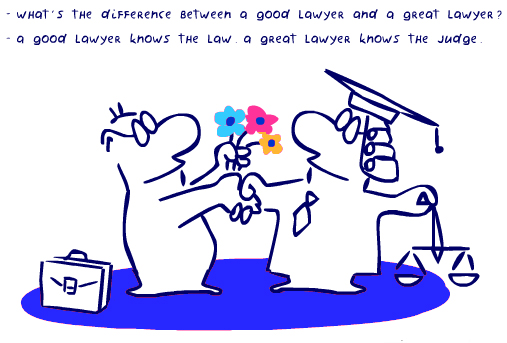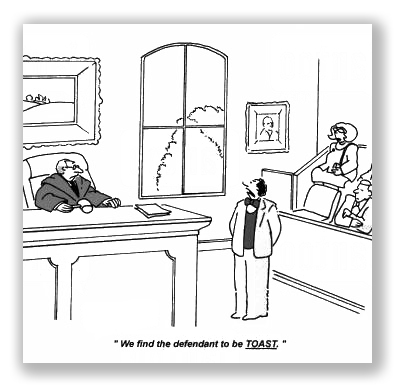We post news and comment on federal criminal justice issues, focused primarily on trial and post-conviction matters, legislative initiatives, and sentencing issues.

FATHER KNOWS BEST
Seldom is a defendant is such a mess that the advice of his family or friends cannot make things worse. That’s what happened to David Day.
David faced a messy white-collar case, one that could easily yield a Guidelines sentence of more than 90 months. His public defen der was top-drawer (as full-time public defenders usually are): she could assess a loser of a case, and she did, negotiating a government offer for a 51-month sentence.
der was top-drawer (as full-time public defenders usually are): she could assess a loser of a case, and she did, negotiating a government offer for a 51-month sentence.
But parents always want the best for their kids. Although David was in his mid-30s, his Dad figured prominently in planning his defense. And Dad, who had seen all of the relevant TV shows, figured a court-appointed lawyer couldn’t possibly be any good. He convinced David to reject the offer, and then to dump his PD in favor of hiring two lawyers Dad knew, both whom could smell a fee and thus told David he could easily beat the case.
Things went downhill fast.
After the new lawyers collected their fee, paid over several months (by Dad), they entered their appearance in the case. The government generously re-offered the 51 month deal, but the new lawyers – without ever opening the case files, which they had not yet bothered to pick up from the public defender – told David to reject 51 months and go to trial.
 A few weeks later, the new lawyers finally picked up the files and read the discovery. For the first time, they could see that David was toast. They convinced him to plead, but by then there was no deal. He entered an open plea, which is a plea to the whole indictment without any deal whatsoever. When all the dust settled, David got 92 months.
A few weeks later, the new lawyers finally picked up the files and read the discovery. For the first time, they could see that David was toast. They convinced him to plead, but by then there was no deal. He entered an open plea, which is a plea to the whole indictment without any deal whatsoever. When all the dust settled, David got 92 months.
David filed a 28 USC § 2255 post-conviction motion, arguing the hired lawyers were incompetent for telling him to reject the plea offer without having first read the file. That seems like a pretty basic blunder. But David’s trial judge didn’t think so. She denied the § 2255 motion without a hearing, holding that even if the lawyer had done that, David could not show he was prejudiced by their mistake, because the government’s offered plea agreement would not have bound the court to a particular sentence, so there was no guarantee the judge would have sentenced David to 51 months.
Last week, the 7th Circuit reversed. The proper inquiry, the Circuit said, is not whether the sentencing court is bound by a plea agreement, but whether it is reasonably probable that the court would have accepted its terms and that the resulting sentence would have been less than the one that was actually imposed.
The 7th complained that the “judge’s prejudice analysis also overlooks the practical realities of plea negotiations. Few court observers would contend that the government’s views as reflected in its plea stipulations and Guidelines recommendations have no influence on a judge’s real-world sentencing decisions… Judges usually follow the nonbinding recommendation in Rule 11 type B agreements in part because they know that not accepting prosecutors’ sentencing recommendations will hamper plea negotiations in future cases. Why would prosecutors offer nonbinding plea agreements — and defendants accept them—if they count for nothing in the sentencing decision?
 The government weirdly warned the Circuit that ruling in David’s favor would produce “absurd results” by encouraging defendants to engage incompetent attorneys. Of course they would: it makes perfect sense to hire a dummy and get slammed with a lot of time, so that you can roll the dice on your less-than-10% chance that you can win your § 2255 a few years down the road.
The government weirdly warned the Circuit that ruling in David’s favor would produce “absurd results” by encouraging defendants to engage incompetent attorneys. Of course they would: it makes perfect sense to hire a dummy and get slammed with a lot of time, so that you can roll the dice on your less-than-10% chance that you can win your § 2255 a few years down the road.
Ask David. He’s already served all but 12 months of his 92-month sentence. No doubt he’s happier to have his rights vindicated after he’s done the time he would not have had if he had stuck with his public defender.
The Court, with regal understatement, wrote the government argument “strikes us as an entirely unrealistic concern.”
Day v. United States, 2020 U.S. App. LEXIS 19640 (7th Cir. June 24, 2020)
– Thomas L. Root

